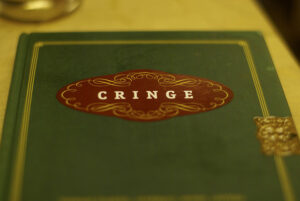“What do you write about?”…..aw, crap. *That* question.
The question all writers dread: What do you write?
We can usually fob this off by genre-listing: I write literary fiction and erotica, non-fiction, and dabble a bit in sci-fi and fantasy.
The problem is that this isn’t really what they’re asking and if they’re not the easily-assuaged type, they follow up with an even worse question: What do you write about?

For the love of god, just read the book!
I think the reason this question is so hard is because, to answer it, you have to reveal a rather large part of your soul, and that’s just not something people like to do at all, much less at cocktail parties or when meeting someone new.
Consider my answer: I write about that moment it dawns on someone that their whole world is not only not what they thought it was, but is actually only tenuously balanced on a teetering structure of lies they’ve told themselves to keep from seeing reality. And I agree with Flannery O’Connor, we only get to that moment through violence.

This is always a good look to get when explaining
something that lives at the center of your soul.
That’s pretty much a conversation-stopper.
Thank God, because the next question, asked with any of a variety of “I’m uncomfortable now” faces, is: Why do you write about that?
Sometimes I say this: I’m drawing a road map so if people want to give themselves an authenticity check-up, they know where to go.
Which I realize is waaaay too cryptic.
So I wrote a little story to illustrate what I’m talking about. (That’s an annoying thing we writers do. If we can’t get you to understand with “telling,” we’ll get all metaphorical on you. It probably makes you want to slap us, but what can we do?)
Anyway, it goes like this:
Change
It wasn’t until I was shoved up against the wall, your fist an inch from my face, that I started to think, “I’d like not to be here again, if I can help it.”
Does your fist have to land first? Or can it stop there, your breath hot on my face, your other hand twisted in the front of my shirt? Is that enough?
Probably.
But maybe not.
I know the path out is more than this scene; this is just physicality, the flesh between you and me. But maybe I need the fist on flesh, the splitting of skin, the warmth of my own blood, to convince me I am, indeed, walking down a path that no longer suits me.
How did I get here? Ah. That is a question that will keep you up at night if you really try to answer it.
It wasn’t by thinking. Or not thinking. There is a third thing, as Hegel said, as I say, as we know from experience. There is always a third thing. And sometimes a fourth, fifth, and sixth thing. But there are never, ever just two things.
In this instance, there is the wall. There is the fist. One, two. But there is also the space between them. And in that space exists something I spent a lot of time not naming—not because I can’t, but because I won’t. It is responsibility.
I have to look in that space and see my own path, my own choices, and how they led to this, “this” being whatever it is that serves to scare the shit out of us, in this case being shoved up against a wall and threatened with physical violence.
Those choices are what lurk in the dark after the kiss has been administered, the drink of water has been consumed, the song has been sung. They are the monster under the bed that no flashlight or candle can eradicate. Why are they so scary? Because we have met them, and they are us.
Those choices are the basis for the shadow agreement I’ve made with you—we promise to recreate our bad times for each other. “I’ll stay with you even though you threaten to hit me,” my agreement goes, “because this recreates the intense fear I felt living in my house growing up.”
Me cringing against the wall did not start with me storming into the apartment and saying the stupid shit I said. No, I watched my father and mother scream at each other for years first, felt the way that made something sharp and hot crawl into my stomach and settle. I watched how she pestered him constantly about what he was doing and how it wasn’t good enough, smart enough, right, well done, or even wanted. I watched them both do their damndest to prove the other was worthless.
I watched and learned that the sharp-hot belly, and the screaming, and the shaming, was what I was supposed to feel, and do. And I picked you, in the shadow world of unexamined neuroses, because you were the perfect match for making sure I could recreate those things forever.
I paved my adult path with the shattered concrete I had been handed through the years, constantly trying to match it up, make it whole, not looking closely enough to realize it was never going to fit together again, that the right choice was to look for an unbroken piece and work with that.
So now I stand, your fist an inch from my face, between the moment you grabbed me and this moment, the mobius strip of time slipping through my nostrils and out of my mouth, my eyes wide open. . .
My feet do not move but something in me slides out, around you, down the hall. It pads into the bedroom and gathers together my clothes and lights a match and throws it on, watches as the flames lick around the edges of the pile, dance upwards, throw smoke up to form a black shadow on the ceiling. A shadow I need to leave behind.
Your hand uncurls and drops. My shirt falls into wrinkles filled and pressed with your sweat. You back away and run into the couch. I watch your body in motion and then at rest. You turn over and press your face into the pillow.
I do not move. I do not have to. I already have.
“Fault” is a word to further distract me from “choices.” It is not a word I want to know any more. I want to know how to rip up the concrete burying me in my choices and watch the darkness wriggle and come to life. I want to dig my hands in until they are black and crawling with filth, until I can taste dirt in the back of my throat, until I can look those choices in the eyes and not look away.
Until I know what they are and why I made them.
And then I want to leave the earth torn up and turn. And walk a different way.
I turn to the door. For a moment I am still there.
Then I am gone.
It’s not comfortable, what I put my characters through in my stories. But comfort does not lead to change. Comfort feeds the shadow agreement.
Comfort is death.
Don’t you want to come up and talk to me at the next cocktail party?

